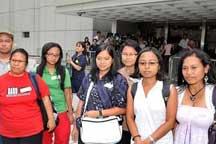1 in 8 households in HK employ a domestic helper

 0 Comment(s)
0 Comment(s) Print
Print E-mail CNTV, January 27, 2014
E-mail CNTV, January 27, 2014
Tens of thousands of nannies work for families in Hong Kong. Most of them come from the Philippines or Indonesia. Many are attracted by higher wages, benefits and legal protection provided by city authorities. It allows them to support their families back home, while they help raise children who are not their own. Zhu Dan takes a closer look at what motivates them and the loneliness they face.
Jasmin is picking up the kids, but they're not her own.
"Sometimes they call me mother, I tell them I'm not your Mummy." Jasmin said.
Jasmin is from the Philippines. She came to Hong Kong two years ago, after 14 years working as nanny in Singapore. She came here because the pay is higher.
"She's doing a great job, she takes good care of my kids and my family, so everybody likes her. Now she's becoming a member of our family." Jasmin' s employer Ingrid Fostier said.
Jasmin is one of 300,000 domestic helpers in Hong Kong. This means roughly one out of eight households in Hong Kong employs a domestic helper, and most of these come from the Philippines and Indonesia.
While Jasmin has settled into her position nicely, others are not so lucky.
Erwiana, a 23-year-old Indonesian helper, claims she was abused by her employer, who has already been arrested. Some say this is rare.
"I think it's an extreme case…" Fostier said.
But for others, it's nothing new. The Mission For Migrant Workers surveyed more than 3,000 women. 18 percent of them said they suffered from physical abuse and 6 percent reported sexual abuse.
HK's Labor Union of Domestic Helpers provides help for victims of abuse here in the city.
"Here we can organize workers unions and hold rallies. In China's Taiwan, Singapore and Malaysia, we can't do that. Hong Kong of China is more open." Grace Shiella, chairperson of HK's Labor Union of Domestic Workers, said.
Free speech and the right to organize are not enough. While HK requires people who employ nannies to follow regulations and provide benefits such as free medical care, there are still cases of abuse. There are now calls for the regulations to be changed
Some are calling for an end to the Two-Week Rule, which forces foreign helpers to leave Hong Kong 14 days after their contract ends. That's not enough time for helpers to file a case against an abusive employer. But the Immigration Department insists that the policy is necessary.
The Immigration Department says it will consider discretionary visa extensions if there is evidence that a foreign helper is abused.
Others want to abolish legislation which forces foreign domestic workers to live with their employers.
It may take years for the Hong Kong SAR's government to reach consensus on this issue, but for individuals, only mutual respect and equal treatment can benefit both employers and the employed.





